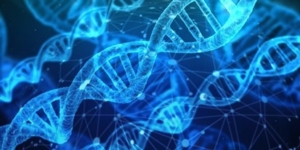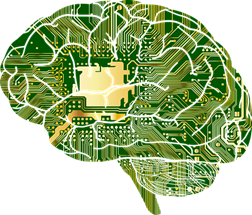Essay #7: Global Brain Emerging?
In the Mission Statement of this Right Brain Network website is a proposed equation for contemplation:
NI (Nature’s Intelligence) + HI (Human Intelligence) + AI (Computer Intelligence) + = ???
Of these three major forms of intelligence now interacting for the first time in human evolution, the most powerful and influential is NI (Nature’s Intelligence).
Of course, we forget this almost all the time. For the past 500 years or so modern civilization has been overly balanced towards the left-hemisphere of the brain’s focus on being separate from nature and able, perceiving it as an object to manipulate for our material benefits. This is most powerful insight from Dr. Iain McGilchrist, author of “The Master and is Emissary: The Divided Brain and the Making of the Western World,” the book which inspired this Right Brain Network project.
We are clearly not separate from nature.
We were born out of nature’s intelligence and live within its complex, self-organizing system. As evolution biologist Dr. Elisabet Sahtouris writes,
“We are natural creatures which have evolved inside a great life system. Whatever we do that is not good for life, the rest of the system will try to undo or balance in any way it can.”
The current viral pandemic and significantly more devastating climate change are proof.
When looking into what might be emerging from the enfolding dynamic of NI + HI + AI, a good place to start is the principle of self-organization–the fascinating ability of totally new paradigms to be generated from complex interactions. Here is a beautiful, intriguing 2-minute video of Nature’s self-organization in action:



Inside the Self-Organizing Universe
The fuel that has been driving evolution is self-organization or what many scientists refer to as “Emergence.” Self-organization/Emergence is an underlying process in which complex, local interactions (cells in our bodies, people navigating traffic, birds in flight) spontaneously, with no external command or instruction, somehow form an overall order far greater than the individual elements giving rise to it.
Our nervous systems and brains function through self-organization all the time at the unconscious level. For the evolutionary leap (into the Next Renaissance?), this under the surface, virtually invisible, self-organizing principle needs to be brought more into the light of consciousness.
In 2003, biologist Dr. Elisabet Sahtouris gave a talk called “After Darwin: Reuniting Spirituality with Science in order to Form a New World View.” The excerpts which follow are from the transcript of that talk
This first excerpt shows Dr. Sahtouris; reliance on a right-hemisphere perspective:
“…trained as a western scientist I came to feel that the world view I was taught was too narrow, like a suit one had outgrown, and was searching for the broader context for what a Western science would be. I’ve been working on that now for quite a few decades and have come to the view that consciousness is not a late emergent product of a material evolution but the exact opposite, the source of all material evolution. So, I’ve come to believe that spirituality and science were separated only for historic reasons and that it’s time now to reunite them in a single world view that can encompass the best of our spiritual traditions and the best of our scientific traditions.”
Leaving aside for now that we have different takes on what spirituality is, the key point here is the calling for a “broader context,” in which to view science. She identifies the shift in perspective which has taken place among many biologists who know that the standard definition of biological life, “survival of the fittest” in a competitive zero-sum game paradigm, needs to be broadened.
As for her insight that “consciousness is not a late emergent product of a material evolution but the exact opposite, the source of all material evolution,” while still a minority view among most mainstream scientists, it has been attracting more adherents from within the realm of science over the past 50 years. We will address this issue more in future essays, but my own intuitive sense is in agreement that mind/consciousness is not simply a by- product of the brain’s activity (materialist perspective), but, that consciousness/mind-like qualities are an inherent, emergent quality of nature itself (and the universe out of which Earth’s nature was born). And so this and other essays in this Next Renaissance section are based on the paradigm that our brains operate from within this larger context of Mind/Intelligence.
Note: An interesting analogy here is the synaptic leap required by our ancestors during the Italian Renaissance when in 1543 astronomer Nicolas Copernicus provided empirical evidence that the sun didn’t revolve around the earth, but the earth was one of a number of planets revolving around the sun. In depth psychological terms, the human ego had to give up its inflated sense of being the center of the universe and adapt to the reality Earth was part of a much more vast, complex solar system.

Here in the 21st Century, as we head towards the next evolutionary leap, we will be required to develop a bigger picture of how our brains fit into the fast-expanding, interrelated, global network of the World Wide Web.
Dr. Sahtouris writes,
“We have a new definition of life in biology in the last few decades called autopoiesis [from the Greek, meaning self-creation], which means that a living entity is one that continually creates itself. This is very unlike a machine which is created from the outside by an inventor, given its rules of operation, and usually in a hierarchic arrangement and has to be reinvented to have generations of technology rather than being able to reinvent itself in an evolutionary trajectory.”
“Autopoiesis” is part of the self-organization principle. And the description Dr. Sahtouris provides is filled with right-hemisphere qualities: “continually creates itself,” as contrasted with “hierarchic arrangement” which requires outside instructions in order to “reinvent.”
As discussed in a previous essay, in the new VUCA strategy being adapted to meet the current hyper-speed, digitalized, globalizing effects of Volatility, Uncertainty, Complexity and Ambiguity, we are called upon to develop a mind-set that resonates with nature’s inherent biologic intelligence, which in Dr. Elisabet Sahtouris’ words, is nature’s ability to “reinvent itself in an evolutionary trajectory.”
She describes the inherent self-organizing intelligence of the DNA which created us:
“We know now there are what biologists call repair genes. When there’s accidental damage to the genome it is immediately repaired. Otherwise these errors would build up and you wouldn’t be able to function for a whole lifetime. We now know there are editor genes when DNA is copied that make sure it’s copied correctly. There are repair genes fixing any damage done so again we have to give up the Darwinian notion that evolution occurs through accidents and trust that the genome is intelligent. We see it’s intelligent.”
“We have a hundred trillion cells in our bodies and each one of them has thirty thousand recycling centers renewing our proteins. They’re so hi-tech that they can take in a protein, disassemble it, build a new protein (perhaps an entirely different kind) and issue the new protein. That’s as if we could stick trees into a chipper machine and get a live tree out the other side. Very hi-tech! We’re not nearly as hi-tech yet, as our own internal microworld.”
“We have a great deal to learn from nature…”

Dr. Sahtouris is one of a number of scientists dedicated to teaching a more expansive understanding of nature’s intelligence, out of which we emerged, yet to which humanity over the past 500 years has become separated from through the overemphasis of the left-hemisphere focus of perceiving nature as an object to be analyzed and taken from, over the much needed right-hemisphere intuitive understanding of being ‘embedded’ within nature’s intelligence, in tune with its underlying currents.
Repeating the two-key theme of this essay:
- We human beings, for the first time in evolutionary history, are living in a world generated out of three forms of intelligence: Nature’s Intelligence (NI), our own Human Intelligence (HI) and Computer Intelligence (AI)
- AI emerged out of the human brain, we emerged out of Nature’s Intelligence. And Nature’s Intelligence operates to a great extent through a process called self-organization, described earlier as “complex, local interactions (cells in our bodies, birds in flight, humans collaborating on the Web) spontaneously, with no external command or instruction, capable of generating totally new orders of complexity.
AI, Philosophy & Spirit
Two of the leading experts in computer science who seek a bigger picture of the self-organizing potential of the World Wide Web to enrich our philosophical and spiritual understanding are Dr. Ben Goertzel and Dr. Francis Heylighen
Ben Goertzel is a renowned computer scientist, AI researcher and founder of the SingularityNET Foundation. Francis Heylighen is a physicist who leads the Evolution, Complexity and COgnition group at the Free University of Brussels where he is also associated with the Department of History, Art and Philosophy. They are both part of a collaborative called the Global Brain Institute which looks at the emergent properties of World Wide Web.
(Note: Most of what they talk and write about is much to technical for me to understand—my interest is philosophy and depth psychology and so I will tease out those aspects from what they have written. That said, I find it stimulating and a good exercise for my brain to read material which forces a stretching out into unfamiliar territory, regardless of how much of the content I can understand on an empirical level, a characteristic much more attuned to the right-hemisphere.
Also, the concept of a Global Brain or Global Mind easily evokes images from grade B science fiction and fantasy…particularly when we forget the distinction between the projected fear of a super computer running the world like a human autocrat as compared to more grounded predictions from two researchers steeped in math, computer science and philosophy as to what kind of networked-based, distributed intelligence will emerge out of the expanding, connected network of humans and AI).
Dr. Goertzel writes
“The WebMind system…would be an independent intelligent entity on its own, interacting with humans, but fundamentally separate from them. This is what I call Phase One of the global Web mind; and it will be, in itself, an incredibly exciting development. It will be our first opportunity ever to interact with a highly intelligent nonhuman being. And it will be an opportunity to understand ourselves more deeply, by seeing the subtle patterns of our own collective mind come to life.”
Here Ben makes the important shift from viewing AI as a competing force threatening human intelligence to viewing AI as an evolutionary new form of intelligence now capable of not only recording and accessing the entire history of human knowledge, but capable of teaching itself independent of human-imposed rules). And, included in this shift of perception is the fact that we can use AI to in Ben’s words, “understand ourselves more deeply, by seeing the subtle patterns of our own collective mind come to life.”
A big question hovering over this discussion: Can certain powerful corporations or governments control in an organized way how this potential Global Web Mind will operate? While clearly Google, Facebook, Amazon have significant control over their individual domains, Ben writes,
“The Web, by its very nature, is not under anyone’s control: there is no way to enforce intelligence on it from above. If one is to influence its evolution toward intelligence, one must be subtler. One must use complexity, parallelism and self-organization to seduce the Web toward greater intelligence.”
Again, given the left-hemisphere’s need to control territory, there will clearly be attempts by massive AI corporations to dominate the emerging “WebMind System.” But one of the key characteristics of self-organizing processes is their unpredictability and strong drive to evolve from the bottom-up rather than from the top down.
In an interview Dr. Goertzel conducted with Dr. Heylighen we get the latter’s perspective on this emerging Global Brain/Mind:
“The global brain (GB) is a collective intelligence formed by all people on the planet together with their technological artifacts (computers, sensors, robots, etc.) insofar as they help in processing information. The function of the global brain is to integrate the information gathered by all its constituents, and to use it in order to solve problems, as well for its individual constituents as for the global collective. By ‘solving problems’ I mean that each time an individual or collective (including humanity as a whole) needs to do something and does not immediately know how to go about it, the global brain will suggest a range of more or less adequate approaches. As the intelligence of the GB increases, through the inclusion of additional sources of data and/or smarter algorithms to extract useful information from those data, the solutions it offers will become better, until they become so good that any individual human intelligence pales in comparison.”
Commenting on the important question as to who or what might gain control of the future and dictate its terms, Dr. Heylighen responds,
“For me the issue of freedom in the GB is very simple: you will get as much (or as little) as you want. We do not always want freedom: often we prefer that others make decisions for us, so that we just can follow the lead. In those situations, the global brain will make a clear recommendation that we can just follow without too much further worry. In other cases, we prefer to think for ourselves and explore a variety of options before we decide what we really want to do. In such a case too, the GB will oblige, offering us an unlimited range of options, arranged approximately in the order of what we are most likely to prefer, so that we can go as far as we want in exploring the options.”

What we already see evolving on the Web is the contrast between private, AI corporations (Google, Facebook, Amazon, Microsoft, IBM) based on competition, placing profit first and therefore protecting the privacy of its patented algorithms and what is called “Open Source” entities such as Wikipedia, which are based on collaboration, where the underlying AI architecture is publicly available and anyone can contribute to the end result. If you’re looking for a sign confirming a more optimistic view, consider that the individual who invented the software protocols which created the World Wide Web, Tim Berners-Lee, chose not to patent his paradigm-shifting software for private gain, but instead made it open-source.
Despite his optimism, Dr. Heylighen understands that even before the World Wide Web ever existed, most humans prefer not to make challenging choices, but defer to what we’ve been taught or what the culture determines is the right way to live. So, the issue of “freedom” will remain a choice we have to make to follow the path less predictable, more uncertain, but potentially more creative and soul-fulfilling:
“Culture is already a collective intelligence or GB, except that it reacts and evolves much more slowly than the one we envisage as emerging from the Internet. As you hint at, the risk of having a more interactive GB is that people will have less time to question its suggestions. On the other hand, the GB as I envisage it is by design more explicit than the subconscious conditioning of our culture, and therefore it is easier (a) to remember that its opinions are not our own; (b) to effectively examine and analyze the rationale for these opinions, and if necessary reject them.”
Another complex, fascinating and significant question is whether super intelligent AI can ever at any level become “self-conscious,” a quality in large part responsible for us being the most intelligent species on the planet. Dr. Heylighen responds to this question:
“Certainly, self-reflection appears like a useful feature for the GB to have. Again, this does not seem to be so tricky to implement, as we, in our role of components of the GB, are at this very moment reflecting about how the GB functions and how this functioning could be improved… Moreover, decades ago already AI researchers have developed programs that exhibited a limited form of self-improvement by monitoring and manipulating their own processing mechanisms.”
Bringing the subject down to a practical level, Dr. Heylighen, responding to the question as to what technologies exist right now that might be pushing towards the emergence of a Global Brain lists 21st century digital tools most all of use every day…to our left hemisphere, they are marvelous technologies which offer immense convenience and nearly instantaneous connection. But if we let the imaginative/big-picture/paradigm-shifting capacity of our right-hemispheres to contemplate just how novel and intricate these everyday tools could be self-organizing into some yet-to-be transcendent intelligence, what comes up?
Dr. Heylighen cite:
1. wikis
“(and related editable community websites) provide a very simple and intuitive medium for people to develop collective knowledge… Wikipedia is the most successful example: in ten years’ time it developed from nothing into the largest public knowledge repository ever conceived, which may soon contain the sum of all human knowledge.”
2. collaborative filtering (aka recommendation systems)
“This is the technology (based on closely guarded algorithms) used by sites such as YouTube and Amazon to recommend additional books, videos or other items on the basis of what you liked, and what others like you have liked previously. Unlike wikis, this is a collective intelligence technology that relies on implicit data, on information that was rarely consciously entered by any individual, but that can be derived relatively reliable from what that user did (such as ordering certain books, or watching certain videos rather than others). If wiki editing is similar to the rational, conscious reflection in the brain, collaborative filtering is similar to the subconscious, neural processes of selective strengthening of links and spreading activation.”
3. Smartphones
“make it possible to tap into the global brain at any time and any place. From simple person-to-person communication devices, these have morphed into universal, but still simple and intuitive interfaces that connect you to all the information that is globally available. This adds a very practical real-time dimension to GB problem-solving…Thanks to in-built sensing technologies, such as a GPS, a compass, a camera and a microphone, a smart phone can first determine your local context (e.g. you are standing in front of the Opera building at sunset facing West while hearing some music playing in the background), then send that information to the GB together with any queries you may have…”
The need to shift to a more right-hemisphere perception of the self-organizing potential of exponentially expanding digital network intelligence and how we might best adapt it to our knowledge and insight into how we best fit into nature’s intelligence is illuminated by Peter Russell. Author of the book “The Global Brain Awakens,” Russell, who holds degrees in theoretical physics, computer science and psychology writes:
“Western science sometimes finds it difficult to address the notion of emergent orders of existence. This is because one of the principle ways in which it has tried to understand the world is to break phenomena and processes down into smaller units, using what is called the reductionist approach. Although valuable in some areas, such as physical chemistry, engineering, and computer programming, it has the drawback that emergent qualities of the whole system are usually lost or not dealt with.”

CODA:
A key insight which generated this look into the potential of an emerging Global Brain came from evolution biologist Dr. Elisabet Sahtouris presented at the beginning of this essay:
“We are natural creatures which have evolved inside a great life system. Whatever we do that is not good for life, the rest of the system will try to undo or balance in any way it can.”
In addition to calling on us to consider how our actions are adversely affecting nature’s inherent move towards “balance,” it reminds us that we are born out of this evolutionary intelligence, which we forget when stuck in the left-hemisphere’s need to objectify (separate away from) and perceive nature as an object to analyze and take from, rather than grow from within it.
If a Global Brain or Global Mind is emerging out of the self-organizing complexity of the World Wide Web, it will have totally novel, mind-boggling characteristics we can’t even begin to comprehend by adding up all of the elements involved. For any leap in self-organizing complexity is based on “The Whole being greater than the sum of its parts.”
One way to contemplate it is from the perspective Dr. Sahtouris suggests: “We are natural creatures which have evolved inside a great life system.” If a Global Brain is emerging, will we will be inside of it, part of its distributive intelligence? Or as Dr. Goertzel suggests, will it be an advanced form of intelligence independent from us?
Every day billions of us are emailing, tweeting, Google searching, Pushing “Like” buttons on Facebook, uploading and downloading our desires, fears, deep insights, petty differences and spiritual values through digital screens, coursing through fiber optic cables, under oceans, across continents at 134,300 miles per second, beamed up and down form orbiting satellites and back into our brains.
At the same time, quantum computers and genetic engineering are on the verge and climate change is accelerating in ways no human experts or supercomputers can fully predict.
What is emerging? Are we headed towards the Next Renaissance or Mass Anxiety?
Most likely, both.
Which serves as a reminder of the key insight from Buddhist Teacher Robert Thurman previously discussed in Essays #5, 6 & 7:
“Wisdom is tolerance of cognitive dissonance.”
Wisdom is inherent in Nature’s ability, through self-organizing/Emergence to generate totally new “Wholes” out of the sum of interacting “parts.” And for the first time in evolution here on Earth, self-conscious mammals with unique frontal cortexes and right-hemisphere capabilities for intuitive wisdom and imaginative synaptic leaps, are consciously participating in the next evolutionary shift.
Systems Theorist John Platt offers:
“Anyone who is willing to admit that there have been sudden jumps in evolution or human history, such as the invention of agriculture or the Industrial Revolution, must conclude from this evidence that we are passing through another such jump far more concentrated and more intense than these, and of far greater evolutionary importance.”
There are good reasons to be optimistic and pessimistic. The Next Renaissance could emerge as well as a Sisyphean nightmare of reactionary fear, materialistic greed and emotional implosion.
Much will depend on what values we, as individuals, and even more importantly, in collaborative groups, decide are most important if we are willing to contemplate:
NI (Nature’s Intelligence)
+ HI (Human Intelligence) +
AI (Computer Intelligence) = ???!!!
As Cyberspace journalist Douglas Rushkoff, whose insights we will be covered in a future Essay, writes:
“The web of inter-connected computer networks provides the ultimate electronic neural extension for the growing mind. To reckon with this technological frontier of human consciousness means to reevaluate the very nature of information, creativity, property, and human relations.”
End.
Enjoy the following quotes / insights / links
“Any sufficiently advanced technology is indistinguishable from magic.”
Scientist & Science Fiction Writer Arthur C. Clark
“What we plant in the soil of contemplation, we shall reap in the harvest of action.”
Theologian, Philosopher, Mystic Meister Eckhart
“For the first time in human evolution, the individual life is long enough, and the cultural transformation swift enough, that the individual mind is now a constituent player in the the global transformation of human culture.”
Cultural Historian/Philosopher William Irwin Thompson
